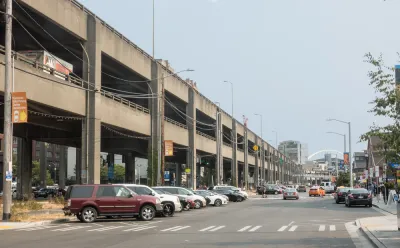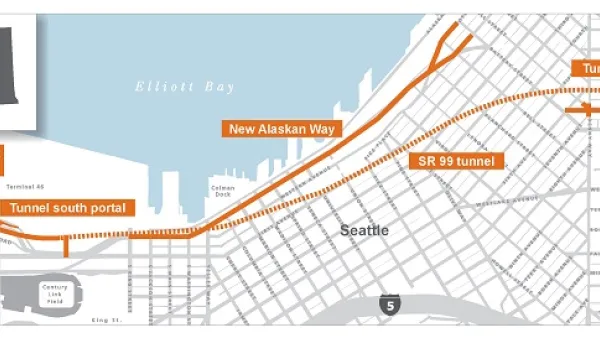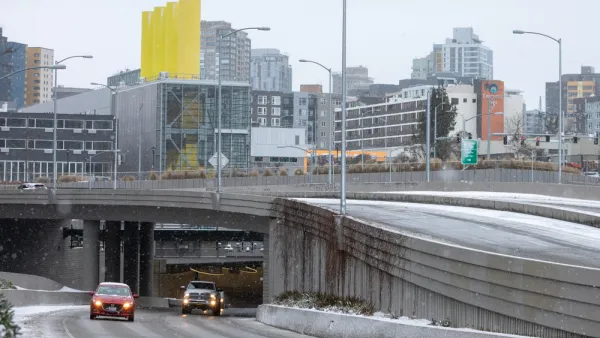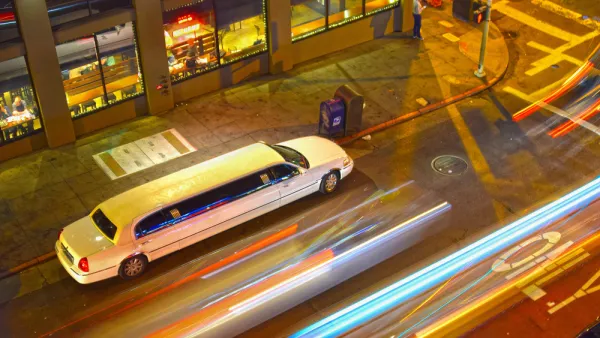The Washington State Transportation Commission has begun the planning process to determine the toll schedule for the tunnel that replaces part of the Alaskan Way Viaduct that opens this fall. They must raise six percent of the $3.3 billion cost.

"The Washington State Transportation Commission announced Tuesday [May 22] that it is implementing the public input and review process on three toll-rate options that are under consideration," reports Kurt Schlosser for GeekWire. The commission has scheduled open house and public input meetings for June 4, 5 and 6.
The tunnel is slated to open to traffic as early as this fall. The state Legislature determined in 2012 that tolling would be needed to raise $200 million of the $3.3 billion it cost for the Alaskan Way Viaduct Replacement Program and cover ongoing operation and maintenance costs.
What's noteworthy about the project, in addition to showing how motorists are expected to only pay six percent of the construction costs through tolls, is that this may be one of the few highway projects in the nation where a toll road replaces a portion of an untolled road, State Route 99, an observation noted by the Portland Metro Area Value Pricing Advisory Committee that appears poised to recommend tolling one or two untolled interstates.
Schlosser describes the three toll rate options, A, B, and C, which at first glance appear remarkably similar. All use congestion pricing based on time-of-day, as opposed to dynamic, pricing, beginning at $1.00 and topping at $2.25. Where they differ is also notable as all indicate how much and over what period they will increase; e.g., "option A" calls for toll rates to increase 3 percent every three years.
The 1.7-mile tunnel will have two lanes running north and south and utilize electronic toll collection. "Drivers traveling in either direction will be charged as they exit the tunnel," adds Schlosser, noting that tolls will not be charged when the tunnel opens "and that it has not been determined when tolling will start."
Seattle cordon area congestion pricing
As posted last month, "Seattle will develop a plan to toll city roadways as part of its efforts to reduce traffic congestion and greenhouse-gas emissions." It turns out that tolling SR 99 appears to have been the genesis of the city council's decision to consider cordon area congestion pricing.
"Seattle City Councilmember Mike O'Brien is concerned people will detour through downtown streets in order to skip the Highway 99 toll," reported Paige Browning for KUOW on Nov. 1, 2017.
"If they toll at the rate necessary to pay back the bonds, we expect significant diversion to our city streets, which could have a serious impact on traffic downtown and specifically on transit times downtown," he said.
O'Brien proposed that the city spend $200,000 for a study that was reported on April 4 "would likely be put out for bid in the next couple of weeks" with initial findings possible by October.
Hat tip to IBTTA SmartBrief.
FULL STORY: From $1 to $2.25 — state seeks public input on proposed toll rates inside Seattle’s new tunnel

Analysis: Cybertruck Fatality Rate Far Exceeds That of Ford Pinto
The Tesla Cybertruck was recalled seven times last year.

National Parks Layoffs Will Cause Communities to Lose Billions
Thousands of essential park workers were laid off this week, just before the busy spring break season.

Retro-silient?: America’s First “Eco-burb,” The Woodlands Turns 50
A master-planned community north of Houston offers lessons on green infrastructure and resilient design, but falls short of its founder’s lofty affordability and walkability goals.

Test News Post 1
This is a summary

Analysis: Cybertruck Fatality Rate Far Exceeds That of Ford Pinto
The Tesla Cybertruck was recalled seven times last year.

Test News Headline 46
Test for the image on the front page.
Urban Design for Planners 1: Software Tools
This six-course series explores essential urban design concepts using open source software and equips planners with the tools they need to participate fully in the urban design process.
Planning for Universal Design
Learn the tools for implementing Universal Design in planning regulations.
EMC Planning Group, Inc.
Planetizen
Planetizen
Mpact (formerly Rail~Volution)
Great Falls Development Authority, Inc.
HUDs Office of Policy Development and Research
NYU Wagner Graduate School of Public Service




























